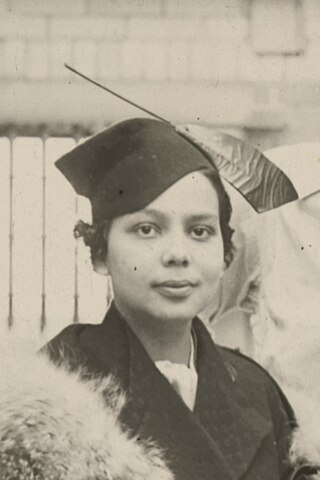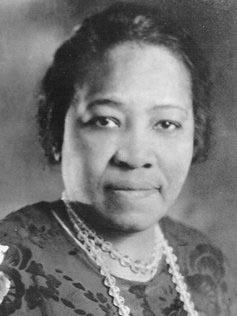Related Research Articles

Irene Amos Morgan, later known as Irene Morgan Kirkaldy, was an African-American woman from Baltimore, Maryland, who was arrested in Middlesex County, Virginia, in 1944 under a state law imposing racial segregation in public facilities and transportation. She was traveling on an interstate bus that operated under federal law and regulations. She refused to give up her seat in what the driver said was the "white section". At the time she worked for a defense contractor on the production line for B-26 Marauders.

Constance Baker Motley was an African American jurist and politician who served as a Judge of the United States District Court for the Southern District of New York.

The Iowa Supreme Court is the highest court in the U.S. state of Iowa. The Court is composed of a chief justice and six associate justices.

Autherine Juanita Lucy was an American activist who was the first African-American student to attend the University of Alabama, in 1956. Her expulsion from the institution later that year led to the university's President Oliver Carmichael's resignation. Years later, the University admitted her as a master's student and in 2010 a clock tower was erected in her honor on its campus.

Arabella Mansfield, born Belle Aurelia Babb, became the first female lawyer in the United States in 1869, admitted to the Iowa bar; she made her career as a college educator and administrator. Despite an Iowa state law restricting the bar exam to males, Mansfield had taken it and earned high scores. Shortly after her court challenge, Iowa amended its licensing statute and became the first state to accept women and minorities into its bar.
State of Iowa v. Katz was a landmark civil rights victory involving the Katz Drug Store in downtown Des Moines, Iowa.

Juanita Elizabeth Jackson Mitchell was born in Hot Springs, Arkansas, and was the first African-American woman to practice law in Maryland. She was married to Clarence M. Mitchell, Jr., mother of two Maryland State Senators, and grandmother of one.

Clara Shepard Luper was a civic leader, schoolteacher, and pioneering leader in the American Civil Rights Movement. She is best known for her leadership role in the 1958 Oklahoma City sit-in movement, as she, her young son and daughter, and numerous young members of the NAACP Youth Council successfully conducted carefully planned nonviolent sit-in protests of downtown drugstore lunch-counters, which overturned their policies of segregation. The success of this sit-in would result in Luper becoming a leader of various sit-ins throughout Oklahoma City between 1958 and 1964. The Clara Luper Corridor is a streetscape and civic beautification project from the Oklahoma Capitol area east to northeast Oklahoma City. In 1972, Clara Luper was an Oklahoma candidate for election to the United States Senate. When asked by the press if she, a black woman, could represent white people, she responded: “Of course, I can represent white people, black people, red people, yellow people, brown people, and polka dot people. You see, I have lived long enough to know that people are people.”

Louise Frankel Rosenfield Noun was a feminist, social activist, philanthropist, and civil libertarian.
Gwendolyn Wilson Fowler was an African-American pharmacist, the first black woman licensed in Iowa. She also became the first African-American woman from Iowa to serve in the United States Foreign Service, when she was posted to Vietnam in the 1950s. She was inducted into the Iowa Women's Hall of Fame in 1987.

Christia V. Daniels Adair was an African-American suffragist and civil rights worker based in Texas. There is a mural in Texas about her life, displayed in a county park which is named for her.

The Flynn–Griffin Building, also known as the Flynn Block, Peoples' Savings Bank Building, and the Edna M. Griffin Building, is a historic building located in Des Moines, Iowa, United States. It was listed on the National Register of Historic Places in 2016.
Evelyne Jobe Villines was an American disability rights advocate and political activist who had Poliomyelitis. Villines worked for both the state of Iowa and the federal government as an advocate. The Des Moines Register called her a "nationally known spokeswoman for the disabled" in 1992.

Annie Nowlin Savery was an American suffragist and philanthropist based in Des Moines, Iowa. She is known as a pioneer feminist and activist for woman suffrage. She began taking part in the woman suffrage movement in the 1860s, and became a leader in the county and state, speaking widely and helping establish organizations to support it.

Katz Drug Store was a regional chain of pharmacies in the Midwestern United States.

Sue M. Wilson Brown was an African-American activist for women's suffrage. She was inducted into the Iowa Women's Hall of Fame in 1995.
Sarah Elizabeth Ray was an African American civil rights activist who in 1945 was denied entry on SS Columbia, a ferry operated by the Bob-Lo Excursion Company. She initiated a legal battle against the company via the NAACP which eventually ended up being processed by the United States Supreme Court. The court ruled in Ray's favor, setting her case as a precursor to Brown v. Board of Education. After the Bob-Lo Co. Vs. Michigan court case, she went on to create the Action House in Detroit which helped to empower Black youth in the city and offered spaces for recreational activities. She was posthumously inducted into the Michigan Women's Hall of Fame in 2021.

Virginia Harper was a civil rights activist known for her work against the rerouting of U.S. Highway 61 (US 61) through the Mexican-American and Black neighborhoods of Fort Madison, Iowa.
Jean Y. Jew was an American academic who was a tenured professor at the University of Iowa College of Medicine. She retired in 2010.
Ruth Bluford Anderson was a social worker and professor at the University of Northern Iowa (UNI).
References
- 1 2 "Iowa Commission on the Status of Women". iowa.gov. Archived from the original on 2010-11-10. Retrieved 2014-04-17.
- ↑ Lowe, Jessica. "Edna Griffin: Civil Rights movement pioneer. Des Moines woman became known as the 'Rosa Parks of Iowa.'". Iowa History Journal. Iowa Publishing Corp. Retrieved 19 November 2023.
- 1 2 3 4 5 6 7 "Historic Auto Trails - Edna M. Griffin Memorial Bridge". Iowa Department of Transportation. Archived from the original on 2014-04-17. Retrieved 2018-03-18.
- 1 2 3 4 "Griffin, Edna Mae Williams – The Biographical Dictionary of Iowa -The University of Iowa". uiowa.edu.
- ↑ Swalwell, Katy. "The Myth-Busting History of Edna Griffin". Civil Rights Teaching. Teaching for Change. Retrieved 19 November 2023.
- ↑ "The Des Moines Register - DesMoinesRegister.com". Des Moines Register.
- 1 2 "The Des Moines Register - DesMoinesRegister.com". Des Moines Register.